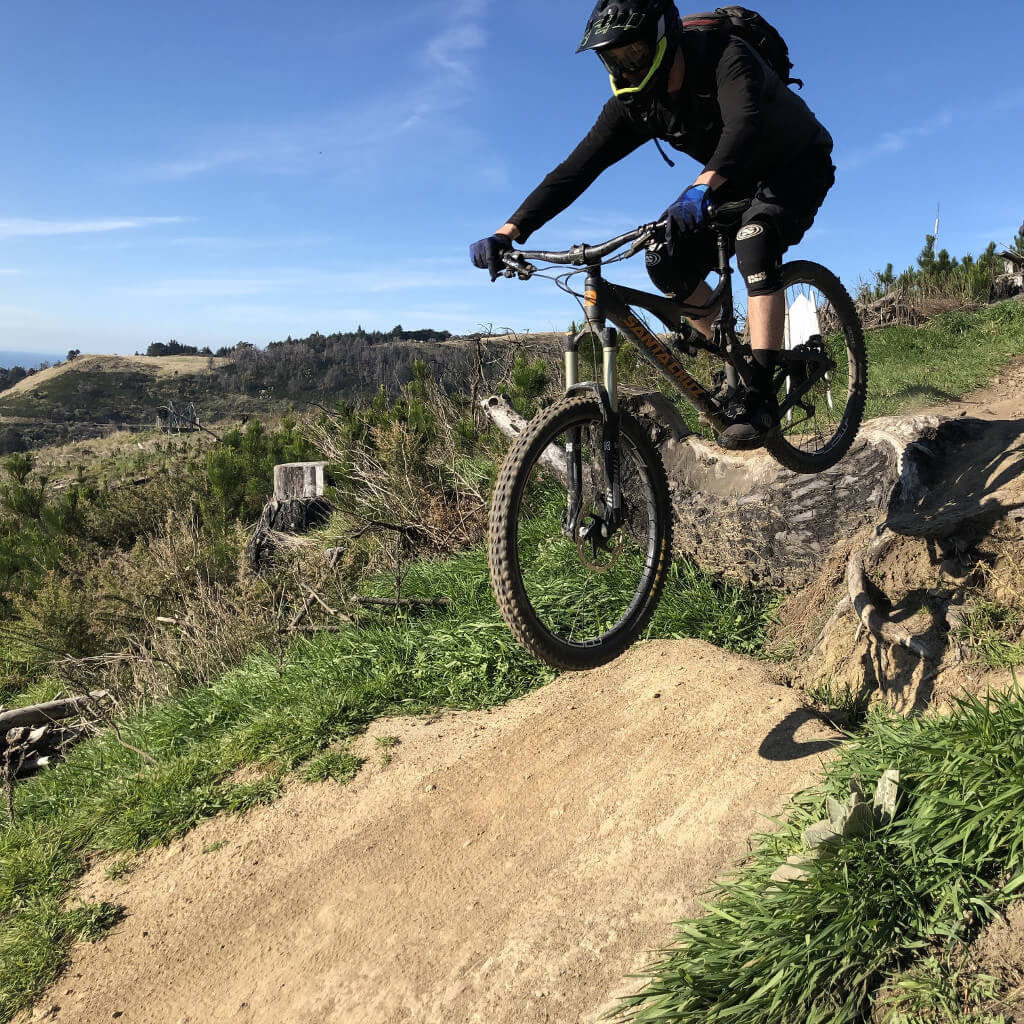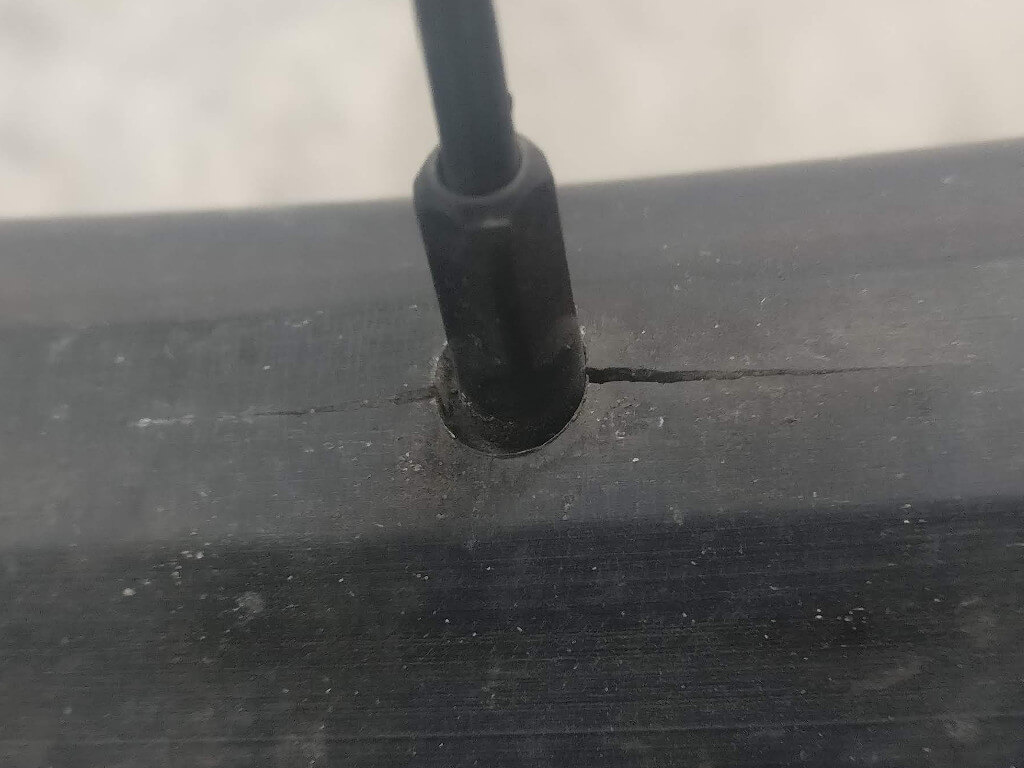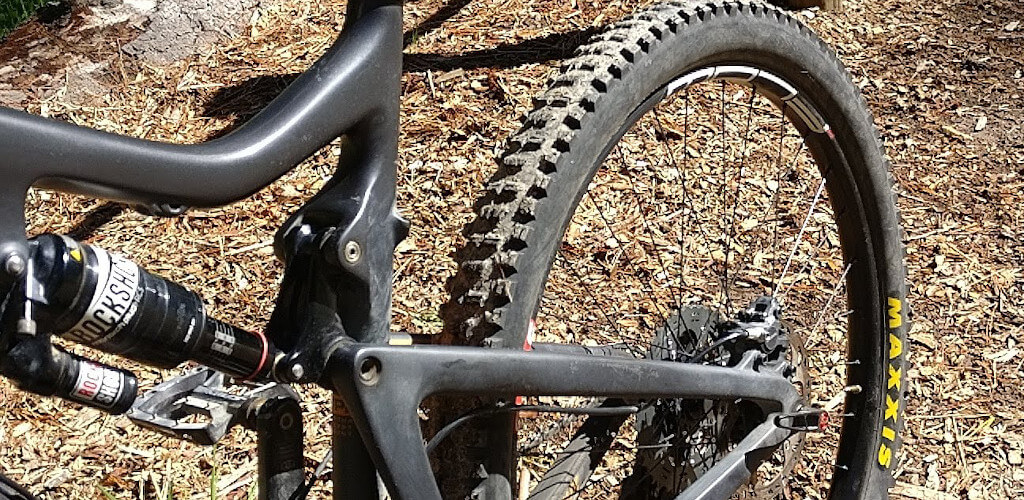The most common reason spokes start breaking periodically one by one on a rear wheel of a bike is due to metal fatigue. Once spokes have reached the end of their useful life in this way, you’re likely to continue having this problem until the wheel is rebuilt, with all spokes replaced at that time, instead of simply fixing each one as and when it breaks.
We recently had this happening on my wifes mountain bike. She doesn’t ride nearly as often as me, but it seemed that every time we’d take her bike down off the garage wall and get ready to head out on a trail, we’d find one single broken spoke.
For a while there I would take it in to the local bike shop we’d bought her bike from, and have them repair it.
It was a pretty cheap fix each time, just the cost of a single new spoke to match the others on the wheel, and a little bit of labor cost obviously. So then we were set to hit the trail – until the next time it happened, yet again.
Quick side note – it took me too long to get myself a spoke tool, to easily tighten up loose spokes. Do yourself a favor and get one for your toolbox! They’re cheap, and sooo handy!
As it just kept happening, it made me wonder what was causing this – this particular bike shop had never offered any explanation or suggestion on how to better solve the problem, and to be fair the occasions she wanted to ride the bike were months apart so I’d never bothered to investigate it further.
But it happened once too often, so I took it to my preferred bike mechanic, and explained what we’d noticed was happening. That is, just one spoke breaking every so often, but more and more regularly it seemed lately – and without much riding at all, and certainly no aggressive riding!
The answer I got made perfect sense…
So why is it that some mountain bike wheels suddenly start often breaking spokes?
My bike mechanic explained that while there could be a few different reasons for spokes breaking, usually when you’re having them break regularly on the same wheel, it’s down to the quality of spokes used, and more importantly that they’ve been fatiguing over time.
Once a mountain bike (or really any type of bike) spoke has been through enough revolutions to cause substantial metal fatigue, the others on the wheel have likely experienced very similar levels of metal fatigue – meaning they’re also ready to break.
While they are not likely to be breaking at exactly the same moment, even if you fix the one that is broken currently, it’s quite likely that you’ll find another spoke that has broken in the next few rides.
In fact, all it needs for this to happen is some amount of weight applying force to that wheel, and a bunch of wheel revolutions – it doesn’t need to be hitting drops, or casing jumps (neither of which my wife would be doing!)

This can further be exacerbated by the wheel having been machine built rather than hand built, with uneven tension applied to all the spokes – allowing the wheel more opportunities to apply a higher amount of fatiguing force to specific spokes on the wheel, rather than more evenly distributing the force around the wheel.
However even a well built wheel can eventually reach this same point – metal fatigue on spokes happens to basically all spokes made of metal after all after enough use.
Another important consideration is the quality and design of the spokes used to build your mountain bike wheel.
J-bend, straight pull, butted spokes, straight gauge spokes – and many different spoke thicknesses, and even types of metal used in the spoke or spoke nipple – all these things play a part.
It is normal for mass produced mountain bike brands to machine build the millions of wheels they require, and is quite common for the spoke quality to be on the lower side to keep their costs down – particularly on entry level or even mid-range mountain bikes.
This was the case with my wifes mid-range full suspension Liv Intrigue trail bike, and over time the spokes had just reached a point where they were failing one by one very regularly.
When getting a wheel repaired or built new by your local bike shop or wheel builder, make sure you discuss with them what will work best for you, your type and frequency of riding (and your weight).
What to do if spokes keep breaking on your mountain bike?
In our case, after that enlightening discussion with my trusted bike mechanic, who’d offered much more detail than the previous bike shop (who had just repaired one spoke each visit and never offered a proper solution to the ongoing problem), we got the wheel rebuilt with new stronger spokes.
The wheel was also hand built by the mechanic who is an experienced mountain bike wheel builder, which does also help.
The crucial thing however is that the wheel has all new fresh spokes, properly tensioned, which are no longer all well on their way to failing. This is the core part of the solution for almost all cases of mountain bikes regularly breaking spokes.
As mentioned above, when getting a wheel built or repaired, make sure you discuss with your bike shop wheel builder the type of spokes they recommend for your style of mountain biking, and taking into account your weight (heavier or more aggressive riders benefiting from stronger spokes).
If you find them less than helpful, or unable to recommend a particular type of spoke for your wheel build, go elsewhere – your mountain bike wheels are too important to be built or repaired by someone who knows very little about wheel strength and reliability.
What other reasons could be causing spokes to break?
Aside from the most common culprit for regularly breaking spokes, you can absolutely break one or multiple spokes (or spoke nipples of course) through other means.
As we all know, mountain biking usually involves thrashing your bike to some degree over rough terrain! That’s part of the fun of the sport after all!
But this naturally does mean that it’s possible to have objects like rocks or branches flying into our wheels during our rides – which can certainly result in a broken spoke that needs fixing, as can crashing and having your bike fly off down the trail into the forest.
Likewise when you’re regularly hitting drops and landing hard, charging through a gnarly rockgarden, or casing the landing of a jump, you’re putting the wheel under some pretty major stress every time that happens.
Head to a bike park and do a bunch of laps, and you’ll soon rack up plenty of bike breaking moments, which I can vouch for all too well!
Can you ride with a broken spoke?
In most cases you can safely finish a ride with a single broken spoke, though you would be wise to get the wheel looked at and repaired by a bike mechanic at your earliest opportunity.
Obviously before you ride on, you’ll need to make sure that you don’t have a broken spoke flailing around, that could potentially do more damage to things, so depending on how it has broken some riders will try to either remove it trail-side, or simply tape it to a nearby spoke until they are home and can take it in for repair at their local bike shop.
Another aspect of finding a broken spoke (or indeed several), is that it may indicate some other issue with your wheel – most commonly in the case where you’ve been riding aggressively, a bent or cracked wheel rim.

It’s really important to check for this, as if you have signs like several broken spokes and a badly cracked rim, that wheel is now severely compromised – and while plenty of mountain bikers would still ride the trail to get home if it is still rolling, it can definitely be more likely to catastrophically fail on you if you’re continuing to ride fast or aggressively on rough terrain or jumps/drops etc.
I’ve been there, done that, destroying more than my fair share of wheels with my enthusiastic yet only moderately skilled riding! Thankfully I’ve never had had a wheel totally implode while riding due to the damage, other than all the tubeless tire sealant pouring out and the tire deflating on the trail due to a broken rim – but that’s a story for another day!
But do keep this in mind – if you’re seeing broken spokes, make sure to check the wheel very thoroughly and get it in to a bike mechanic for repair asap.
I hope this has been helpful, and keeps you out there shredding trail!

